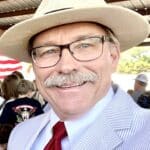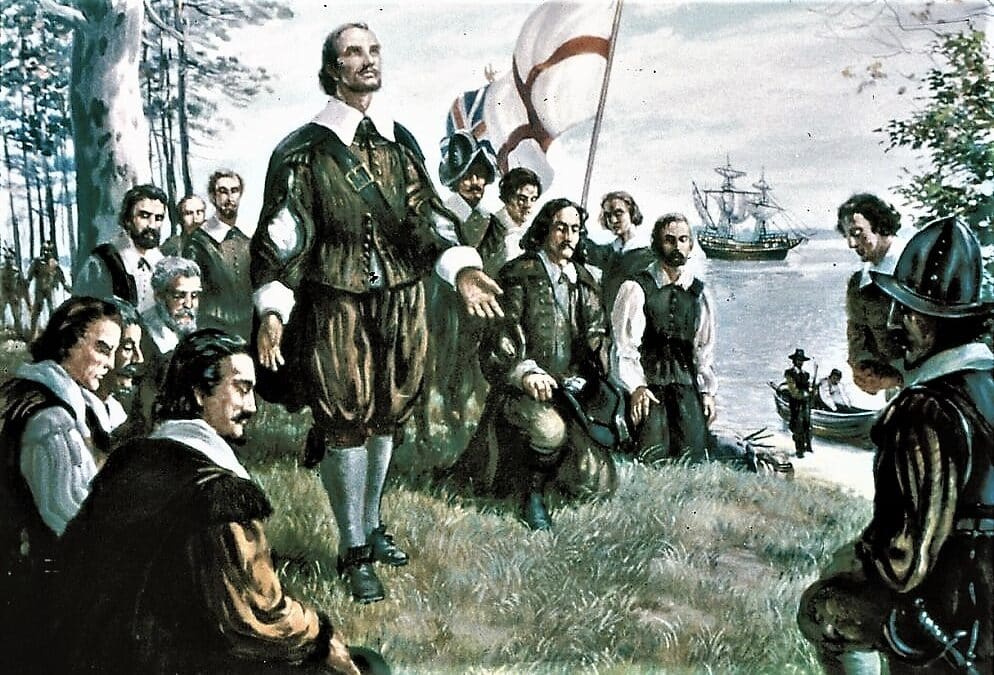Image courtesy of Berkeley Plantation.
The first Thanksgiving in American history was not where most people may think. Contrary to popular belief it was in Virginia, and not Plymouth, Massachusetts.
According to historical and genealogical records:
Captain John Woodlief (Woodliffe) was with the Jamestown settlers in 1609–the Second Charter of the Virginia Company of London. He later returned to England to bring other colonists as well as his wife and family to Virginia. Again he returned to England and in 1619, Woodlief, as captain and governor, sailed from Bristol on the good ship Margaret. He returned with about 40 more settlers to Berkely Hundred along Virginia’s James River. The Virginia Thanksgiving was essentially a prayer service. The very first in the list of written instructions to Woodlief as captain stated: “Wee ordaine that the day of our ships arrivall at the place assigned for the plantacon in the land of Viginia shall be yearly and perpetualy keept holy as a day of thanksgiving to Almighty God.”

The first English Thanksgiving was held at Berkeley Hundred, Virginia in 1619. Image courtesy MarkerHistory.com
Thus, the real first American Thanksgiving was held December 4, 1619, a year before the Pilgrims landed at Plymouth, and two years and 17 days before the fabled New England feast. Thirty-eight English settlers arrived at Berkeley Hundred, which is about 20 miles upstream from Jamestown where Captain Woodlief held the first Thanksgiving service as the newly-landed settlers fell to their knees to thank God for their safe arrival.
Historians say the feast at Berkeley Hundred may have included bacon, peas, cornmeal cakes, and cinnamon water. Regardless the menu, the first Thanksgiving had no turkey, no dressing, no cranberry sauce, no festive holiday cheer, and no love fest between Native American Indians and English colonists. America’s first Thanksgiving, was about prayer and being thankful for survival.
During the murderous terror of March 22, 1622, and battle with the Powhatans, led by Opechancanough, nine of the settlers at Berkeley Hundred were killed, as well as about a third of the entire population of the Virginia Colony. It became known as the Indian massacre of 1622.
Following the massacre, the Berkeley Hundred site and other outlying locations were abandoned as the colonists withdrew to Jamestown and other more secure points. Because of this it took more than 309 years before Berkeley Plantation’s missing history was discovered in 1931. The Nibley Papers, give Yate’s account of the sea voyage with first story in Yate’s series about the Virginia Thanksgiving. It was published in The Richmond News Leader in 1931.
Eventually the site of Berkeley Hundred became the property of Theodorick Bland of Westover. The Berkeley Hundred patent was inherited by Giles Bland, son of John Bland. Giles Bland was hanged by Governor Sir William Berkeley in 1676, for his role participating in Bacon’s Rebellion. Berkeley Hundred was then confiscated by Governor Berkeley, and the land was purchased in 1691 by Benjamin Harrison.
In 1726, the site became Berkeley Plantation, and became the traditional home of the Harrison Family, one of the First Families of Virginia. Berkeley Plantation was the birthplace of William Henry Harrison, 9th U.S. President and Benjamin Harrison V, signer of the Declaration of Independence. It is also the Ancestral Home of Benjamin Harrison, the 23rd U.S. President.
In 1963, President John F. Kennedy issued a proclamation recognizing Berkeley Hundred and Virginia’s claim to be the first Thanksgiving in America.





 RSS - Posts
RSS - Posts
Whereas your point is well taken, it has not been recognized as a significant part of our history as a nation. This colony, as all people were more religious in those days, did not establish a colony for freedom but for financial gain. They had no covenant as an established group as did the Pilgrims with their Mayflower Compact. Their community was not one of peace, religion, or government but of commerce. This is the difference between this Thanksgiving and the First Thanksgiving recognized in our history as a nation. Our roots go back to who we are. May God bring us back to Him with Thanksgiving for freedom of religion, freedom of a fair government of the people and the freedom of enterprise.